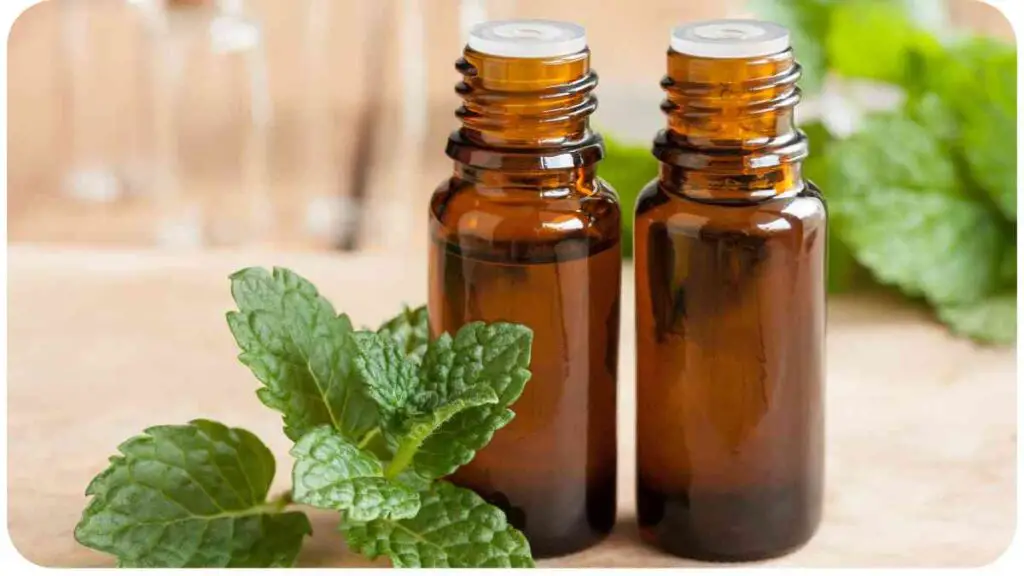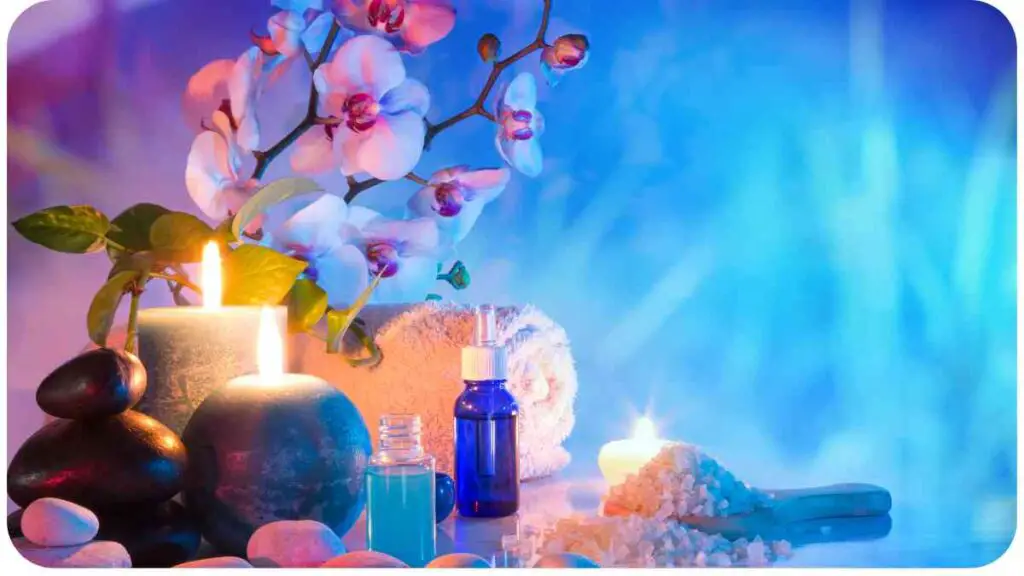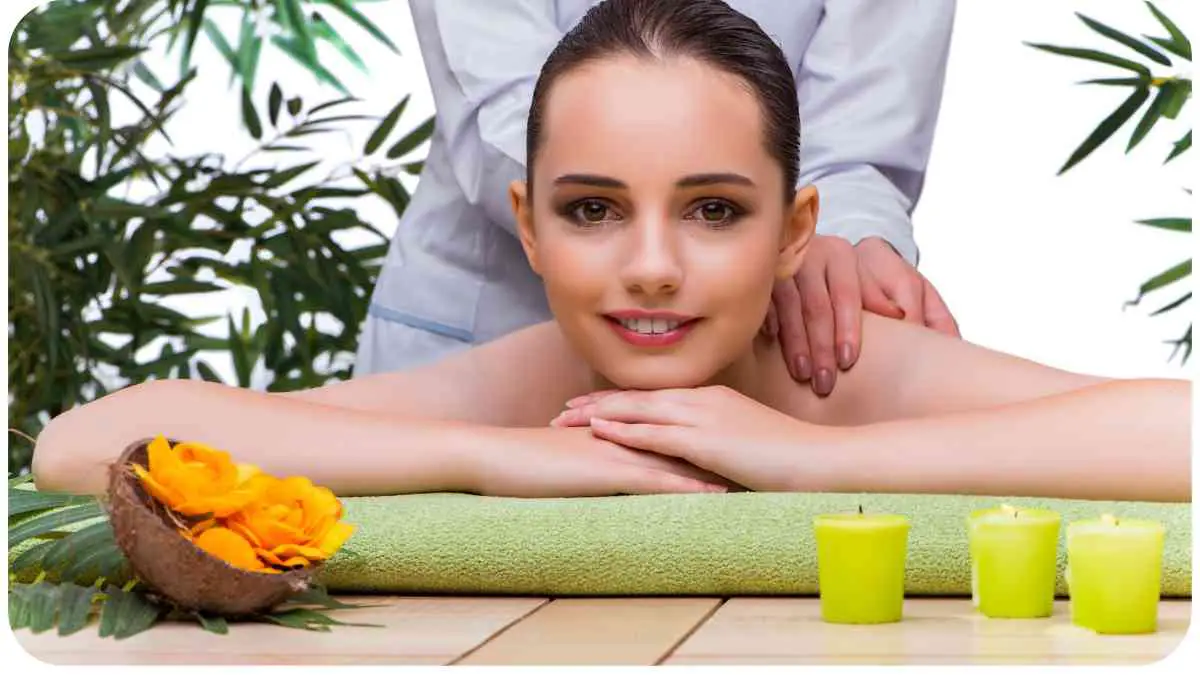Aromatherapy, the art of using essential oils to promote physical and emotional well-being, can significantly enhance your massage experience. When combined with massage therapy, aromatherapy can ease muscle tension, reduce stress, and uplift your mood. The synergy of the massage and the aromatic scents creates a truly immersive and therapeutic experience.
| Takeaway |
|---|
| Aromatherapy can enhance relaxation and promote well-being during massage sessions. |
| Proper selection of essential oils can personalize the aromatherapy experience. |
| Communication with the massage therapist is important to ensure a customized massage. |
| Creating a soothing environment with dim lighting and calming music enhances the experience. |
| Safety precautions, such as patch testing and proper dilution, should be followed. |
| Aromatherapy can be combined with other relaxation techniques for enhanced benefits. |
| Before using aromatherapy during pregnancy or for specific conditions, professional guidance is recommended. |
Table 1: Essential Oils and Their Benefits
| Essential Oil | Benefits |
| Lavender | Calming, promotes relaxation and better sleep |
| Peppermint | Invigorating, relieves muscle aches and headaches |
| Eucalyptus | Eases respiratory congestion and promotes mental clarity |
| Chamomile | Soothes inflammation and promotes deep relaxation |
| Rosemary | Stimulates circulation and aids in mental focus |
2. Choosing the Right Essential Oils for Your Massage

Selecting the appropriate essential oils is crucial for an effective aromatherapy massage. Consider your desired outcome and personal preferences when choosing essential oils. For example, if you are looking for relaxation, lavender or chamomile essential oils may be ideal. If you seek a revitalizing experience, go for peppermint or eucalyptus.
Aromatherapy adds a holistic touch to massages, enhancing relaxation and healing. Discover its wonders in The Healing Power of Aromatherapy Massage as essential oils create a serene ambiance, promoting a sense of tranquility and well-being during your massage session.
Table 2: Recommended Essential Oils and Their Effects
| Desired Outcome | Recommended Essential Oils |
| Relaxation | Lavender, Chamomile, Bergamot |
| Revitalization | Peppermint, Eucalyptus, Lemon |
| Stress Relief | Ylang Ylang, Clary Sage, Frankincense |
| Pain Relief | Rosemary, Ginger, Marjoram |
Remember to dilute essential oils properly in a carrier oil such as sweet almond or jojoba oil before applying them to the skin during your massage.
3. Understanding Different Massage Techniques
To make the most of your aromatherapy massage session, it’s helpful to have a basic understanding of different massage techniques. Here are a few popular techniques commonly used:
- Swedish Massage: This technique involves long, gliding strokes, kneading, and circular movements to promote relaxation and improve circulation.
- Deep Tissue Massage: With focused pressure and slow strokes, deep tissue massage targets deeper layers of muscle and connective tissue to alleviate chronic muscle tension and discomfort.
- Thai Massage: Using a combination of stretching and deep pressure, Thai massage improves flexibility, releases tension, and enhances energy flow.
- Hot Stone Massage: Smooth, heated stones are placed on specific points of the body, helping to relax muscles, improve blood flow, and melt away tension.
Elevate your massage experience by incorporating essential oils. Learn about the Benefits of Using Essential Oils in Your Massage Therapy and how these natural extracts enhance relaxation, ease muscle tension, and provide a rejuvenating sensory journey, making your session truly therapeutic.
Table 3: Massage Techniques and Benefits
| Massage Technique | Benefits |
| Swedish Massage | Enhances relaxation, reduces muscle tension, improves blood circulation |
| Deep Tissue Massage | Alleviates chronic pain, reduces inflammation, improves posture |
| Thai Massage | Increases flexibility, relieves muscle tension and pain, boosts energy |
| Hot Stone Massage | Promotes deep relaxation, reduces stress, relieves muscle pain and stiffness |
4. Preparing for Your Aromatherapy Massage

To fully enjoy your aromatic massage experience, it’s important to prepare yourself and create a soothing environment:
- Select the Right Essential Oils: Choose essential oils that align with your desired outcome and personal preferences. Refer to Table 1 for guidance.
- Communicate with Your Massage Therapist: Inform your therapist about any allergies, skin sensitivities, or medical conditions you may have. They can help customize the massage to suit your needs.
- Create a Relaxing Atmosphere: Dim the lights, play soft music, and ensure the room temperature is comfortable. Consider using an essential oil diffuser to fill the room with pleasant aromas.
- Take a Relaxing Shower: A warm shower before the massage can help relax your muscles and remove any dirt or excess oils from your skin.
5. Enhancing the Massage Experience with Aromatherapy
During your aromatherapy massage, the combination of skilled massage techniques and the aroma of essential oils can provide a heightened sense of relaxation and well-being. Here are some tips for maximizing the benefits of aromatherapy during your massage:
- Inhale the Aromas: Take deep breaths and inhale the soothing scents of the essential oils used during the massage. Close your eyes and focus on the aroma to enhance relaxation.
- Visualize: As you breathe in the fragrances, visualize yourself in a serene and peaceful place. Let your mind wander and imagine yourself surrounded by nature or enveloped in comforting warmth.
- Enjoy the Massage Techniques: Pay attention to the massage techniques being used and how they make you feel. Relax your muscles, allowing the therapist’s skilled hands and the aromatic scents to work together to ease tension.
- Engage Your Senses: Allow yourself to fully engage your senses during the massage. Feel the pressure of the therapist’s hands, enjoy the aromas, and appreciate the soft music playing in the background.
Embark on a soothing journey with Hot Stone Massage: A Beginner’s Guide. Experience the blissful combination of heated stones and expert massage techniques, inducing deep relaxation and releasing tension. Discover the art of hot stone massage, a practice that melts away stress and promotes profound tranquility.
Table 4: Aromatherapy Massage Benefits and Techniques
| Benefit | Technique |
| Relaxation | Long, gliding strokes |
| Stress Relief | Kneading and circular movements |
| Pain Relief | Deep pressure on specific points |
| Emotional Well-being | Gentle, rhythmic movements |
6. Aromatherapy Massage for Specific Conditions
Aromatherapy can be tailored to address specific conditions or concerns you may have. Here are a few examples of how aromatherapy massage can benefit certain situations:
- Insomnia: If you struggle with sleeplessness, incorporating essential oils such as lavender, chamomile, or bergamot into your massage can help promote relaxation and improve sleep quality.
- Headaches: Peppermint and lavender essential oils have analgesic properties that can help alleviate tension headaches. Ask your therapist to focus on the neck and shoulder area during the massage.
- Stress and Anxiety: Ylang ylang, clary sage, and frankincense essential oils are known for their calming properties. Combined with a gentle massage, these oils can help reduce stress levels and promote a sense of tranquility.
- Muscle Pain: Essential oils like rosemary, ginger, and marjoram have anti-inflammatory and analgesic effects, making them great choices for relieving muscle pain and soreness.
Table 5: Aromatherapy for Specific Conditions
| Condition | Recommended Essential Oils |
| Insomnia | Lavender, Chamomile, Bergamot |
| Headaches | Peppermint, Lavender |
| Stress and Anxiety | Ylang Ylang, Clary Sage, Frankincense |
| Muscle Pain | Rosemary, Ginger, Marjoram |
It’s important to note that aromatherapy massage is not a substitute for medical treatment. If you have any medical conditions or concerns, it’s always best to consult with your healthcare provider.
Say goodbye to foot discomfort with The Effectiveness of Massage Therapy in Treating Plantar Fasciitis. This informative guide explores how massage therapy aids in relieving plantar fasciitis pain. Explore specialized techniques and experience relief as skilled therapists target specific points, enhancing your overall well-being.
7. Combining Aromatherapy with Other Relaxation Techniques
To enhance your overall relaxation and well-being, consider combining aromatherapy with other relaxation techniques. Here are a few practices that pair well with aromatherapy massage:
- Meditation: Before or after your massage, engage in a short meditation session to calm your mind and promote inner peace. Focus on your breath and allow the aromas to further enhance your meditative experience.
- Deep Breathing Exercises: Practice deep breathing exercises during your massage to fully engage with the aromas and promote relaxation. Inhale deeply through your nose, hold for a few seconds, and exhale slowly through your mouth.
- Yoga or Stretching: Combine your aromatherapy massage session with gentle yoga or stretching exercises. This can help further release tension, increase flexibility, and promote better energy flow.
- Warm Baths: After your massage, consider taking a warm bath infused with essential oils. This can extend the benefits of the aromatherapy and help you continue to relax even after the massage session ends.
Table 6: Relaxation Techniques to Combine with Aromatherapy
| Technique | Benefits |
| Meditation | Calms the mind, promotes mindfulness, reduces stress |
| Deep Breathing Exercises | Enhances relaxation response, reduces anxiety |
| Yoga or Stretching | Increases flexibility, releases muscle tension |
| Warm Baths | Further relaxation, prolongs the effects of aromatherapy |
8. Safety Precautions and Considerations
While aromatherapy can be a wonderful addition to your massage experience, it’s essential to take certain safety precautions into account. Here are some guidelines to ensure a safe and enjoyable aromatherapy massage:
- Patch Test: Before using any new essential oil, perform a patch test on a small area of your skin to check for any allergic reactions or sensitivities. Dilute the essential oil and apply a small amount to your inner forearm. Wait for 24 hours to see if any adverse reactions occur.
- Proper Dilution: Essential oils are highly concentrated and should always be diluted before applying them directly to the skin. Follow the recommended dilution ratios and use a carrier oil such as sweet almond or jojoba oil to dilute the essential oils.
- Avoid Sensitive Areas: Keep essential oils away from sensitive areas such as the eyes, ears, and mucous membranes. If you accidentally get essential oil in these areas, flush with water immediately.
- Consult a Professional: If you have any medical conditions or are pregnant, it’s crucial to consult with a qualified aromatherapist or healthcare professional before using essential oils during a massage. Some oils may not be suitable for certain conditions or stages of pregnancy.
Athletes, enhance your performance and recovery with Massage Therapy for Athletes: What to Expect and Its Benefits. Delve into tailored massage sessions designed to improve flexibility, reduce muscle soreness, and optimize athletic performance. Discover the rejuvenating power of massage tailored to athletes, providing physical and mental rejuvenation for peak performance.
Table 7: Safety Precautions for Aromatherapy Massage
| Safety Precautions |
| Perform a patch test before using new essential oils |
| Dilute essential oils properly before applying to the skin |
| Avoid sensitive areas such as eyes, ears, and mucous membranes |
| Consult a professional if you have medical conditions or are pregnant |
9. Frequently Asked Questions (FAQs)
Here are some common questions people have about aromatherapy during massage:
Q: Can I choose my own essential oils for the massage? A: Absolutely! Feel free to communicate your preferences to your massage therapist. They can guide you in selecting the right essential oils based on your desired outcome and personal preferences.
Q: Can aromatherapy massage help with stress and anxiety? A: Yes, aromatherapy massage can be highly beneficial for stress and anxiety relief. The relaxing scents of essential oils combined with the soothing touch of massage help promote relaxation and create a sense of calm.
Q: How long do the effects of aromatherapy last after the massage? A: The effects of aromatherapy can vary from person to person. Some people may experience a lingering sense of relaxation and well-being for several hours after the massage, while others may find the effects to be shorter in duration. However, incorporating relaxation techniques and self-care practices can help prolong the benefits.
Q: Can I use aromatherapy if I have sensitive skin? A: It’s important to exercise caution if you have sensitive skin. Perform a patch test before using any new essential oils and always dilute them properly. If you experience any irritation or discomfort, discontinue use and consult with a healthcare professional.
Q: Can I use aromatherapy during pregnancy? A: During pregnancy, it’s crucial to consult with a qualified aromatherapist or healthcare professional before using essential oils. Some oils are contraindicated during pregnancy, while others can be used safely with proper dilution and under professional guidance.
10. Conclusion
Incorporating aromatherapy into your massage session can enhance relaxation, promote well-being, and provide a truly immersive experience. By carefully selecting essential oils that align with your desired outcome and preferences, communicating with your massage therapist, and creating a serene environment, you can make the most of your aromatherapy massage.
Remember to follow safety precautions, seek professional guidance if needed, and enjoy the combined benefits of massage and aromatherapy for a rejuvenating experience.
Further Reading
Here are some additional resources for further reading on the topic of aromatherapy during massage:
- Massage Therapy Journal: Massage and Aromatherapy Benefits
- This article explores the benefits of combining massage therapy with aromatherapy, discussing the positive effects on relaxation, stress reduction, and overall well-being.
- Aromatherapy 101: Beginner’s Guide
- This beginner’s guide provides a comprehensive overview of aromatherapy, including information on essential oils, their properties, and how to incorporate them into massage sessions for maximum benefits.
- The Guide to Using an Aromatherapy Diffuser in Massage
- This guide focuses on the use of aromatherapy diffusers in massage settings, explaining the benefits of diffusing essential oils and providing practical tips on how to incorporate diffusers into massage therapy practice.
FAQs
Here are some frequently asked questions about aromatherapy during massage:
Q: Are there any essential oils I should avoid during a massage session?
A: Yes, some essential oils can be irritating or have contraindications for certain conditions. It’s important to consult with a qualified aromatherapist or healthcare professional to ensure the safe use of essential oils during a massage.
Q: Can I use aromatherapy oils if I have allergies?
A: If you have allergies, it’s important to exercise caution when using essential oils. Perform a patch test before applying them to your skin and avoid oils that you are known to be allergic to. Consult with a healthcare professional if you have any concerns.
Q: How do I choose the right essential oils for my massage session?
A: Consider the desired outcome of your massage, such as relaxation or pain relief, and choose essential oils that align with those objectives. It can also be helpful to consult with a qualified aromatherapist who can provide personalized recommendations.
Q: Is it possible to have an adverse reaction to essential oils during a massage?
A: While adverse reactions are rare, they can occur, especially if you have sensitive skin or allergies. It’s important to perform a patch test before applying any new essential oil and discontinue use if you experience any adverse effects. Seek professional guidance if needed.
Q: Can I use aromatherapy during pregnancy?
A: Pregnancy requires special considerations when using essential oils. Some oils are safe for use during pregnancy, while others should be avoided. It’s crucial to consult with a qualified aromatherapist or healthcare professional who can guide you on the safe and appropriate use of essential oils during pregnancy.

Hi! I’m Hellen James, and I’m a massage therapist. I’ve been practicing massage for therapy for years, and it’s an incredible way to help your body get the relief it needs.
I’ve worked with hundreds of clients and seen some really amazing results. Many of them have been people who suffer from chronic pain and massage has been able to help them reduce or even eliminate their reliance on painkillers and other medications.


